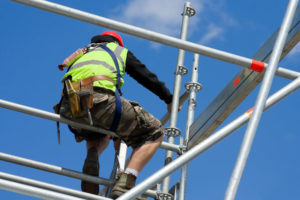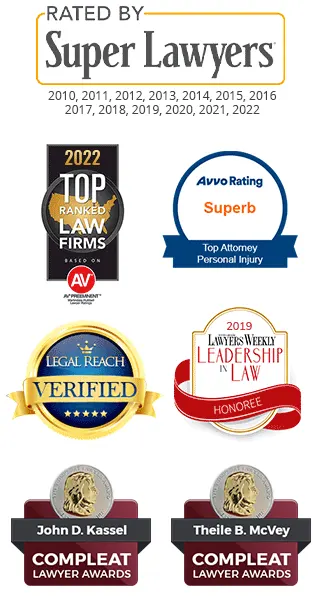

Scaffolding / Fall Accidents
 Scaffolding collapse accidents and falls from work site scaffoldings are counted as among the most significant causes of deaths from falls in the United States and South Carolina every year.
Scaffolding collapse accidents and falls from work site scaffoldings are counted as among the most significant causes of deaths from falls in the United States and South Carolina every year.
Throughout the United States in 2015, falls accounted for almost 39%, or 364 out of 937 total deaths in the construction trade. It’s been estimated that scaffolds are responsible for as many as 65% of all construction site injuries in the country.
Falls, slips and trips at South Carolina construction sites (including those from scaffoldings) led to seven deaths in 2015, according to data from the BLS, which is the statistical agency of the federal Department of Labor that collects, processes, analyzes and disseminates essential statistical data to the public.
The BLS estimates that scaffold-related accidents account for 4,500 injuries and over 60 deaths nationwide every year. It also revealed that 72% of workers injured in scaffold accidents said the accidents that happened to them were caused by either planking or supports giving way, or by being struck by a falling object.
Non-fatal injuries that result from a fall from a scaffolding include fractured bones, traumatic brain injuries, lacerations, neck and back injuries, spinal cord injuries leading to paralysis, and knee, ankle and foot injuries, among many others.
At Kassel McVey our attorneys are committed to helping construction accident victims get the full compensation they need and deserve. If you’ve been seriously injured from a scaffolding fall or collapse, contact Kassel McVey for a free case evaluation.
A Truly Preventable Accident
The Occupational Safety and Health Administration (OSHA) has standards for worker safety and fall protection. Scaffolding accidents are all too often preventable, simply by following safety rules and regulations mandated by OSHA and the South Carolina Department of Labor, Licensing & Regulation Division of Occupational Safety and Health (SC OSHA).
These safety standards require employers to have a qualified person train all employees that work on a scaffold or use a ladder as part of their job. OSHA requires that training must allow employees to spot hazards associated with the kind of scaffold or ladder they plan to use, and to understand the ways to control or minimize those hazards.
OSHA reports that some 2.3 million construction workers in the U.S., or 65% of the construction industry, work on scaffolds.
When scaffolding is erected at a work site, the contractor or the party in charge has a responsibility to ensure workers are reasonably safe from falls. OSHA also has regulations for using ladders (including job-made ladders) at work sites.
For scaffolding supports to be safe for construction workers, they need to be erected according to the construction safety standards established by OSHA.
The agency’s “Safety Standards for Scaffolds Use in the Construction Industry” aims to protect workers using scaffolding in construction work. OSHA states that scaffolding hazards continue to rank high on the list of the most frequently cited standards in the construction industry. It also affirmed that scaffold-related fatalities account for a significant number of fatalities in the construction workplace.
Fatalities and injuries from falls, however, continue to occur despite federal worker protection laws and laws in South Carolina requiring employers, subcontractors, developers and other firms in the construction industry to maintain a safe work environment, and to follow all applicable workplace safety rules and regulations.
To save money, some employers or supervisors insist on cutting corners on safety by not properly training workers about safe practices, or by not buying or issuing required safety equipment.
Kassel McVey Stands Ready to Help You
At Kassel McVey, we want to protect your best interests. We’ll help you determine what you should rightfully receive for your medical expenses, lost wages, pain and suffering and other damages.
Falls leave many injured workers temporarily or permanently disabled. This results in an extended loss of income and a mountain of medical bills.
We recognize that the process of an injured worker regaining his health after a fall from a scaffold or ladder is likely to be costly, and the course to secure damages, lengthy. It is a sad statistic that many construction workers injured in falls never returned to work again.
It’s also unfortunate that workers’ compensation benefits won’t cover all of an injured worker’s medical expenses. Workers’ compensation pays for only a fraction of a worker’s lost income, and pays nothing at all to the injured worker for his pain and suffering, which might last months or even years.
It is frustrating, too, that workers can’t sue their direct employer for an occupational injury. Injured workers may be able to sue, however, if there’s a negligent third party responsible for causing or contributing to the accident.
If a party other than the employer is responsible for the injury, a workers’ compensation claim combined with a lawsuit against the negligent third party might be an option. Compensation for pain and suffering and any additional damages are possible with a third-party claim.
A scaffold-fall lawsuit might allow a worker to recover more money than a workers’ compensation claim alone. Getting this difficult job done is a challenge better faced with expert legal advice from Kassel McVey.
Contact Kassel McVey Today
Our legal team at Kassel McVey has years of experience handling scaffolding collapse cases resulting in personal injury or death.
To find out how we can help you take action, call us today at (803) 256-4242 and put our experience to work for you.
Personal Injury Lawyers 1330 Laurel Street Columbia, SC 29201 Phone: 803-256-4242
Mailing Address
Post Office Box 1476
Columbia, South Carolina 29202
Fax: (803) 256-1952
Copyright © 2023 John D. Kassel, Attorney at Law, LLC. All rights reserved. Privacy Policy I Terms of Service | Disclaimer
This website is designed for general information only. The information should not be construed to constitute formal legal advice or the formation of a lawyer/client relationship. The results and testimonials listed on this website are specific to the facts and legal circumstances of specific cases and should not be used to form an expectation that the same results could be obtained for other clients in similar matters. This list is not a description or characterization of the quality of the firm's representation, it is not intended to compare one attorney's work to another and is in no way a guarantee of a specific result for your case.

